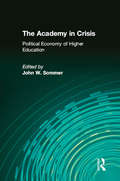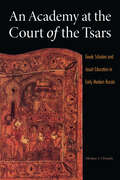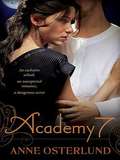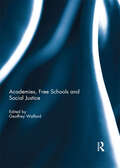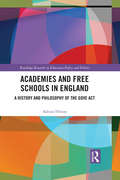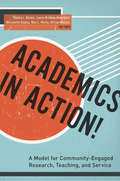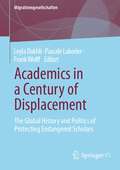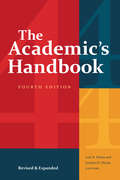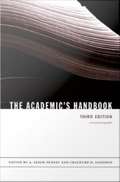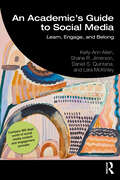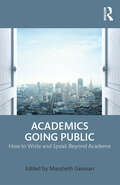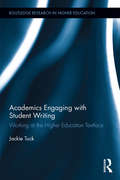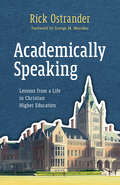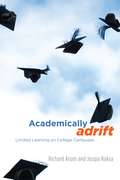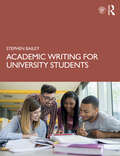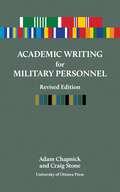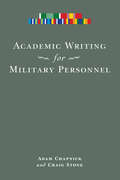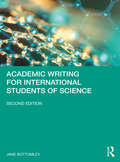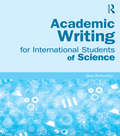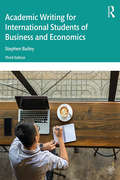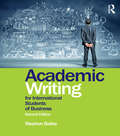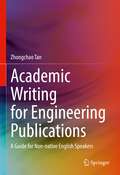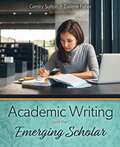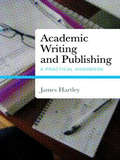- Table View
- List View
The Academy in Crisis: Political Economy of Higher Education
by John W. SommerThe Academy in Crisis is a provocative contribution to an important debate....The costs of goverment support for American universities are not negligible. They include stress on some of the core values of universities and of science-vaules like openness, collaboration, and collegiality-and pressure, too, on other central institutional responsibilities, such as the education of undergradutes. Robert M. Rosenzweig, former president, Association of American Universities.
Academy Dictionaries 1600-1800
by John ConsidineThis is the first unified history of the large, prestigious dictionaries of the seventeenth and eighteenth centuries, compiled in academies, which set out to glorify living European languages. The tradition began with the Vocabolario degli Accademici della Crusca (1612) in Florence and the Dictionnaire de l'Académie françoise (1694) in Paris, and spread across Europe - to Germany, Spain, England, Denmark, Sweden, the Netherlands, Portugal, and Russia - in the eighteenth century, engaging students of language as diverse as Leibniz, Samuel Johnson, and Catherine the Great. All the major academy and academy-style dictionaries of the period up to 1800, published and unpublished, are discussed in a single narrative, bridging national and linguistic boundaries, to offer a history of lexicography on a European scale. Like John Considine's Dictionaries in Early Modern Europe (Cambridge University Press, 2008), this study treats dictionaries both as physical books and as ambitious works of the human imagination.
An Academy at the Court of the Tsars: Greek Scholars and Jesuit Education in Early Modern Russia (NIU Series in Slavic, East European, and Eurasian Studies)
by Nikolaos A. ChrissidisThe first formally organized educational institution in Russia was established in 1685 by two Greek hieromonks, Ioannikios and Sophronios Leichoudes. Like many of their Greek contemporaries in the seventeenth century, the brothers acquired part of their schooling in colleges of post-Renaissance Italy under a precise copy of the Jesuit curriculum. When they created a school in Moscow, known as the Slavo-Greco-Latin Academy, they emulated the structural characteristics, pedagogical methods, and program of studies of Jesuit prototypes. In this original work, Nikolaos A. Chrissidis analyzes the academy's impact on Russian educational practice and situates it in the contexts of Russian-Greek cultural relations and increased contact between Russia and Western Europe in the seventeenth century. Chrissidis demonstrates that Greek academic and cultural influences on Russia in the second half of the seventeenth century were Western in character, though Orthodox in doctrinal terms. He also shows that Russian and Greek educational enterprises were part of the larger European pattern of Jesuit academic activities that impacted Roman Catholic and Eastern Orthodox educational establishments and curricular choices. An Academy at the Court of the Tsars is the first study of the Slavo-Greco-Latin Academy in English and the only one based on primary sources in Russian, Church Slavonic, Greek, and Latin. It will interest scholars and students of early modern Russian and Greek history, of early modern European intellectual history and the history of science, of Jesuit education, and of Eastern Orthodox history and culture.
Academy 7
by Anne OsterlundWith a past too terrible to speak of, and a bleak, lonely future ahead of her, Aerin Renning is shocked to find she has earned a place at the most exclusive school in the universe. Aerin excels at Academy 7 in all but debate, where Dane Madousin?son of one of the most powerful men in the Alliance? consistently outtalks her. Fortunately Aerin consistently outwits him at sparring. They are at the top of their class until Dane jeopardizes everything and Aerin is unintentionally dragged down with him. When the pair is given a joint punishment, an unexpected friendship?and romance?begins to form. But Dane and Aerin both harbor dangerous secrets, and the two are linked in ways neither of them could ever have imagined. . . . .
Academies, Free Schools and Social Justice
by Geoffrey WalfordAcademies were introduced by Labour in 2000 and first opened their doors in 2002, but during Labour’s time in power the nature of the Academies changed. At first they were designed to replace existing failing schools but, by 2004, the expectation had widened to provide for entirely new schools where there was a demand for new places. From 2010, under the coalition government, two new types of Academy were introduced. While the original Academies were based on the idea of closing poor schools and replacing them by dramatically redesigned and restructured ones, the 2010 Academies Act allowed existing highly successful state-maintained schools to apply to become Academies as well. Further, while Labour had restricted Academy status to secondary schools, the Coalition extended it to primary and special schools. The result is that there has been a dramatic increase in the number and diversity of Academies. In addition to this, the 2010 Act introduced Free Schools, wherein groups of parents, teachers, or other sponsors can apply to start their own state-maintained, but officially ‘independent’, schools. These schools can either be completely new or the result of existing private schools applying to become state-maintained. The results of these changes remain under-researched. This book puts forward new research that examines the history and nature of Academies and Free Schools, the processes by which they have come into existence, and their effects in terms of social justice. The contributors do not all speak with one voice, but rather present a diversity of views on these important topics. Included in the collection are the results of research on pupil outcomes and socio-economic segregation; issues of identity and ethos in church academies; the problems of establishing free schools; the history of policy on Academies; and a comparison between Swedish independent schools and Academies and Free Schools. This book was originally published as a special issue of Research Papers in Education.
Academies and Free Schools in England: A History and Philosophy of The Gove Act (Routledge Research in Education Policy and Politics)
by Adrian HiltonAcademies and Free Schools in England argues that there is a high degree of philosophical consensus and historical continuity on the policy of ‘academisation’ across the main political parties in England. It attempts to make sense of what are all essentially free schools by interviewing the architects of policy and their closest advisors, analysing the extent to which they invoke historical expressions of conservatism and/or liberalism in their articulation of that convergence. The book offers a unique insight into educational policy-making during the Conservative/Liberal-Democrat coalition era (2010-2015), and an in-depth analysis of the nature of liberty as it relates to state education in England. Providing original interview transcripts of the key reformers, and new accounts of a sometimes contentious history, Hilton identifies an elite ‘policy community’, connected by educational background, moral-religious frameworks, life experiences and shared networks of common ideology. Academies and Free Schools in England will be vital reading to academics and researchers in the field of education and education policy. It will also be of great interest to school governors, business leaders, political philosophers and those involved and interested in free schools.
Academics in Action!: A Model for Community-Engaged Research, Teaching, and Service
by Sandra L. Barnes Nina C. Martin Lauren Brinkley-Rubinstein Bernadette Doykos Allison McguireThe academy is often described as an ivory tower, isolated from the community surrounding it. Presenting the theory, vision, and implementation of a socially engaged program for the Department of Human and Organizational Development (HOD) in Peabody’s College of Education and Human Development at Vanderbilt University, Academics in Action! describes a more integrated model wherein students and faculty work with communities, learn from them, and bring to bear findings from theory and research to generate solutions to community problems. Offering examples of community-engaged theory, scholarship, teaching, and action, Academics in Action! describes the nuanced structures that foster and support their development within a research university. Theory and action span multiple ecological levels from individuals and small groups to organizations and social structures. The communities of engagement range from local neighborhoods and schools to arenas of national policy and international development. Reflecting the unique perspectives of research faculty, practitioners, and graduate students, Academics in Action! documents a specific philosophy of education that fosters and supports engagement; the potentially transformative nature of academic work for students, faculty, and the broader society; and some of the implications and challenges of action-oriented efforts in light of dynamics such as income inequality, racism, and global capitalism. This edited volume chronicles teaching, research, and community action that influences both inside and outside the classroom as well as presents dimensions of a participatory model that set such efforts into action.
Academics in a Century of Displacement: The Global History and Politics of Protecting Endangered Scholars (Migrationsgesellschaften)
by Leyla Dakhli Pascale Laborier Frank Wolff‘Endangered scholars’ is a recently highly relevant, yet historical notion. Embedded in the greater history of the 20th and 21st centuries, it captures the phenomenon of scholars who, after years of intellectual work and integration in their societies of origin, are forced to seek rescue in foreign host societies. The pressing urgency of the topic thus has an important historical background. From escaping Russian intellectuals after 1917 to the protection of Jewish refugees during World War II, Algerian intellectuals in contemporary history, or persecuted academics from Turkey today: Over the course of about a century, categories of inclusion, transnational relations, and forms of agency of scholars at risk remained surprisingly stable (and hence diachronously and synchronously comparable) while they also adjusted flexibly to contemporary conditions. This collective volume carves out this historical development and its recent expressions. It brings together researchers in a vivid yet largely unconnected field of migration and refugee studies. By developing a complex image of the origin of the global history and politics of protecting endangered scholars from the early 20th century until today, the book contributes to research on academics in exile as a part of refugee research, migration studies, the history of higher education, and the contemporary history of societies. The interdisciplinary volume explores the phenomenon as a historical, political and legal subject, brings together scholars of forced migration and intellectual studies, and includes currently affected scholars into those reflections.
The Academic's Handbook, Fourth Edition: Revised and Expanded
by Lori A. Flores and Jocelyn H. OlcottIn recent years, the academy has undergone significant changes: a more competitive and volatile job market has led to widespread precarity, teaching and service loads have become more burdensome, and higher education is becoming increasingly corporatized. In this revised and expanded edition of The Academic's Handbook, more than fifty contributors from a wide range of disciplines and backgrounds offer practical advice for academics at every career stage, whether they are first entering the job market or negotiating the post-tenure challenges of leadership and administrative roles. Contributors affirm what is exciting and fulfilling about academic work while advising readers about how to set and protect boundaries around their energy and labor. In addition, the contributors tackle topics such as debates regarding technology, social media, and free speech on campus; publishing and grant writing; attending to the many kinds of diversity among students, staff, and faculty; and how to balance work and personal responsibilities. A passionate and compassionate volume, The Academic's Handbook is an essential guide to navigating life in the academy.Contributors. Luis Alvarez, Steven Alvarez, Eladio Bobadilla, Genevieve Carpio, Marcia Chatelain, Ernesto Chávez, Miroslava Chávez-García, Nathan D. B. Connolly, Jeremy V. Cruz, Cathy N. Davidson, Sarah Deutsch, Brenda Elsey, Sylvanna M. Falcón, Michelle Falkoff, Kelly Fayard, Matthew W. Finkin, Lori A. Flores, Kathryn J. Fox, Frederico Freitas, Neil Garg, Nanibaa’ A. Garrison, Joy Gaston Gayles, Tiffany Jasmin González, Cynthia R. Greenlee, Romeo Guzmán, Lauren Hall-Lew, David Hansen, Heidi Harley, Laura M. Harrison, Sonia Hernández, Sharon P. Holland, Elizabeth Q. Hutchison, Deborah Jakubs, Bridget Turner Kelly, Karen Kelsky, Stephen Kuusisto, Magdalena Maczynska, Sheila McManus, Cary Nelson, Jocelyn H. Olcott, Rosanna Olsen, Natalia Mehlman Petrzela, Charles Piot, Bryan Pitts, Sarah Portnoy, Laura Portwood-Stacer, Yuridia Ramirez, Meghan K. Roberts, John Elder Robison, David Schultz, Lynn Stephen, James E. Sutton, Antar A. Tichavakunda, Keri Watson, Ken Wissoker, Karin Wulf
The Academic's Handbook
by A. Leigh Deneef Craufurd D. GoodwinThis new, revised, and expanded edition of the popularAcademic’s Handbookis an essential guide for those planning or beginning an academic career. Faculty members, administrators, and professionals with experience at all levels of higher education offer candid, practical advice to help beginning academics understand matters including: The different kinds of institutions of higher learning and expectations of faculty at each. The advantages and disadvantages of teaching at four-year colleges instead of research universities. The ins and outs of the job market. Alternatives to tenure-track, research-oriented positions. Salary and benefits. The tenure system. Pedagogy in both large lecture courses and small, discussion-based seminars. The difficulties facing women and minorities within academia. Corporations, foundations, and the federal government as potential sources of research funds. The challenges of faculty mentoring. The impact of technology on contemporary teaching and learning. Different types of publishers and the publishing process at university presses. The modern research library. The structure of university governance. The role of departments within the university. With the inclusion of eight new chapters, this edition ofThe Academic’s Handbookis designed to ease the transition from graduate school to a well-rounded and rewarding career. Contributors. Judith K. Argon, Louis J. Budd, Ronald R. Butters, Norman L. Christensen, Joel Colton, Paul L. Conway, John G. Cross, Fred E. Crossland, Cathy N. Davidson, A. Leigh DeNeef, Beth A. Eastlick, Matthew W. Finkin, Jerry G. Gaff, Edie N. Goldenberg, Craufurd D. Goodwin, Stanley M. Hauerwas, Deborah L. Jakubs, L. Gregory Jones, Nellie Y. McKay, Patrick M. Murphy, Elizabeth Studley Nathans, A. Kenneth Pye, Zachary B. Robbins, Anne Firor Scott, Sudhir Shetty, Samuel Schuman, Philip Stewart, Boyd R. Strain, Emily Toth, P. Aarne Vesilind, Judith S. White, Henry M. Wilbur, Ken Wissoker
An Academic's Guide to Social Media: Learn, Engage, and Belong
by Kelly-Ann Allen Shane R. Jimerson Daniel S. Quintana Lara McKinleyAre you an academic who struggles to know what to post on social media and how to disseminate your research effectively on different social media platforms? Social media serves as a powerful communication tool, yet while most academics are aware of the benefits of social media, many are unsure of what to post, and how to do it in a way that is authentic, engaging, and above all, comfortable! This user-friendly practical guide is designed for all academics who aim to engage in social media platforms in an effective and productive way. This book explains how academics can build their reputation, develop networks, and disseminate their research. It includes 365 useful post prompts applicable to all mainstream social media platforms which help guide academics on what to post on the platforms they choose to engage with. The book is designed for all academics at all levels and can be applied across various social media platforms including Facebook, Linkedin, Twitter, and Instagram.
Academics Going Public: How to Write and Speak Beyond Academe
by Marybeth GasmanAcademics Going Public makes the case for academics to enter the public sphere and simultaneously gives them the tools to do so. This important book helps faculty members who want to become more active on a national scale and would like to move beyond publication in scholarly journals and books. Expert contributors explore how to have a voice about salient higher education issues and engage traditional media, new medias, policymakers, funders, and the general public. Chapters offer best approaches and concrete strategies for diverse audiences, helping faculty have an impact on society by becoming more publicly engaged and writing for broader audiences in more inclusive ways. This critical guide also covers strategies for confronting obstacles academics might encounter along the way and presents tactics for responding to controversy and backlash.
Academics Engaging with Student Writing: Working at the Higher Education Textface (Routledge Research in Higher Education)
by Jackie TuckStudent writing has long been viewed as a problem in higher education in the UK. Moreover, the sector has consistently performed poorly in the National Student Survey with regard to assessment and feedback. Academics Engaging with Student Writing tackles these major issues from a new and unique angle, exploring the real-life experiences of academic teachers from different institutions as they set, support, read, respond to and assess assignments undertaken by undergraduate students. Incorporating evidence from post-1992 universities, Oxbridge, members of the Russell Group and others, this book examines working practices around student writing within the context of an increasingly market-oriented mass higher education system. Presenting a wealth of relevant examples from disciplines as diverse as History and Sports Science, Tuck makes extensive use of interviews, observations, texts and audio recordings in order to explore the perspectives of academic teachers who work with student writers and their texts. This book will be of interest to researchers, academics and postgraduate students in the fields of academic literacies, higher education, language and literacy, language in higher education, English for academic purposes and assessment. Furthermore, academic teachers with experience of this crucial aspect of academic labour will welcome Tuck’s pioneering work as an indispensable tool for making sense of their own engagement with student writers.
Academically Speaking: Lessons from a Life in Christian Higher Education
by Rick OstranderA personal odyssey through the world of Christian higher education, narrated by a professional who has worked on both sides of the faculty-administrative divide. What is the world of Christian higher education really like? Rick Ostrander&’s thirty-year career in Christian academia equips him to provide an insider&’s perspective on the field and its future. Ostrander cut his teeth as an undergraduate at Moody Bible Institute and the University of Michigan before completing his PhD with George Marsden at Notre Dame. From there he worked as a professor and administrator at various Christian colleges, a vice president at the Council for Christian Colleges and Universities, and an independent academic consultant. Throughout, he witnessed the many dramatic transformations of Christian higher education. Ostrander traces an attempt to cultivate evangelical intellectualism in the &’90s to the political and economic forces that shake Christian colleges today. Through lively storytelling, Ostrander highlights the qualities and quirks of Christian higher education. His experiences offer readers insight into how Christian colleges can flourish in an age of uncertainty.
Academically Adrift: Limited Learning on College Campuses
by Richard Arum Josipa RoksaIn spite of soaring tuition costs, more and more students go to college every year. A bachelor's degree is now required for entry into a growing number of professions. And some parents begin planning for the expense of sending their kids to college when they're born. Almost everyone strives to go, but almost no one asks the fundamental question posed by Academically Adrift: are undergraduates really learning anything once they get there? For a large proportion of students, Richard Arum and Josipa Roksa's answer to that question is a definitive no. Their extensive research draws on survey responses, transcript data, and, for the first time, the state-of-the-art Collegiate Learning Assessment, a standardized test administered to students in their first semester and then again at the end of their second year. According to their analysis of more than 2,300 undergraduates at twenty-four institutions, 45 percent of these students demonstrate no significant improvement in a range of skills--including critical thinking, complex reasoning, and writing--during their first two years of college. As troubling as their findings are, Arum and Roksa argue that for many faculty and administrators they will come as no surprise--instead, they are the expected result of a student body distracted by socializing or working and an institutional culture that puts undergraduate learning close to the bottom of the priority list. Academically Adrift holds sobering lessons for students, faculty, administrators, policy makers, and parents--all of whom are implicated in promoting or at least ignoring contemporary campus culture. Higher education faces crises on a number of fronts, but Arum and Roksa's report that colleges are failing at their most basic mission will demand the attention of us all.
Academic Writing for University Students
by Stephen BaileyAcademic Writing for University Students is designed to help all students succeed in writing essays, reports and other papers for coursework and exams effectively. Academic writing is often the biggest challenge facing college and university students, but this book provides all the tools needed to master the necessary skills. The book is divided into four parts, to help teachers and students easily find the help they need, both in the classroom and for self-study: The Writing Process: From finding suitable sources, through to editing and proofreading Writing Types: Practice with common assignments such as reports and cause-effect essays Writing Tools: Skills such as making comparisons, definitions, punctuation and style Lexis: Academic vocabulary, using synonyms, nouns, adjectives, verbs and adverbs This key handbook breaks down and practises every stage of essay writing. All units are fully cross-referenced, and a complete set of answers to the practice exercises is included. In addition, the companion website hosts comprehensive teaching notes as well as more challenging exercises, revision material and links to other sources. Designed for self-study as well as classroom use, this book uses authentic academic texts from a range of sources and provides models for common writing tasks such as case studies, while progress checks are included for each part to enable students to assess their learning. Academic Writing for University Students is an invaluable guide to all aspects of academic writing in English.
Academic Writing for Military Personnel, revised edition: Revised Edition (Standalone titles)
by Adam Chapnick Craig StoneAcademic Writing: A Guide for Military Personnel est un manuel de rédaction conçu pour aider le personnel militaire à rédiger des travaux savants dans un style clair et efficace. Fruit de la collaboration entre un professeur d’écriture chevronné et un officier militaire à la retraite, le manuel s’adresse aux membres des forces armées qui rejoignent le monde universitaire et qui ont déjà rédigé dans un contexte professionnel militaire ou qui n’ont aucune expérience de la rédaction. En plus d’enseigner aux officiers comment rédiger efficacement, cet ouvrage explique en quoi la maîtrise des techniques de rédaction est utile au personnel des forces armées dans leurs tâches régulières, en particulier aux échelons supérieurs. L’ouvrage traite de l’importance de savoir communiquer par écrit, de ce qui distingue la rédaction savante de la rédaction professionnelle, des processus de recherche et de rédaction proprement dite, du professionnalisme dans la sphère universitaire ainsi que des problèmes et défis fréquemment rencontrés par les rédactrices et les rédacteurs. Un dernier chapitre novateur traite de la manière dont les officiers peuvent mettre à profit les connaissances qu’ils ont acquises par leurs expériences professionnelles dans le contexte universitaire. Des exemples concrets — à l’usage particulier des militaires — sont présentés tout au long du texte pour guider la lectrice et le lecteur de manière pratique et pertinente.Cette édition révisée comprend de nouveaux exemples provenant d’une plus grande variété d’auteurs. Elle prend en compte l’évolution récente des technologies de communication et reflète les nouvelles avancées dans les domaines de l’enseignement et de l’apprentissage.Cet ouvrage, qui est le seul guide exhaustif sur la rédaction à l’usage du personnel militaire, est un ajout incontournable à la bibliothèque de tout officier militaire où qu’il se trouve et quel que soit son rang.Ce livre est publié en anglais. Note : Une version française de ce livre sera disponible en 2023.Formats disponibles : couverture souple, PDF accessible et ePub accessible
Academic Writing for Military Personnel
by Adam Chapnick Craig StoneAcademic Writing for Military Personnel is written for members of the military who are either new to or re-entering the academic community and who need to familiarize themselves with academic writing. The authors, an experienced writing instructor and a retired military officer, show how persuasive academic writing enhances officers’ effectiveness in their regular duties, especially as they reach more senior levels of service. They explain the differences between staff writing and academic writing, and outline some of the common errors military personnel make when transitioning from one to the other. The book’s chapters outline the value of strong written communication skills, the research process, the writing process, academic referencing, and frequent grammatical and syntactical errors. Specific examples chosen with a military audience in mind are integrated throughout the book to provide the reader with relevant and practical guidance. The book concludes with a discussion on how officers can use the knowledge they have acquired through their professional experiences in their academic work. As the only comprehensive guide to effective academic writing designed specifically for military personnel, this book will be a crucial addition to the libraries of junior and senior officers in militaries worldwide.
Academic Writing for International Students of Science
by Jane BottomleyThis revised and updated second edition is an accessible companion designed to help science and technology students develop the knowledge, skills and strategies needed to produce clear and coherent academic writing in their university assignments. Using authentic texts to explore the nature of scientific writing, the book covers key areas such as scientific style, effective sentence and paragraph structure, and coherence in texts and arguments. Throughout the book, a range of tasks offers the opportunity to put theory into practice. The explorative tasks allow you to see how language works in a real scientific context, practice and review tasks consolidate learning and help you to develop your own writing skills, and reflective tasks encourage you to think about your own knowledge and experience, and bring this to bear on your own writing journey at university. Key features of the new edition include: • Updated content and additional tasks throughout • New chapters, covering writing in the sciences and writing at university • The introduction of reflective tasks • Up-to-date examples of authentic scientific writing Clear, engaging and easy-to-use, this is an invaluable tool for the busy science or technology student looking to improve their writing and reach their full academic potential.
Academic Writing for International Students of Science
by Jane BottomleyAcademic Writing for International Students of Science will help international students to develop their command of academic scientific writing in English. It guides students through the writing process itself, and will help them to produce clear, well-written and well-organised essays and reports. The book covers a range of issues such as how to explain complex ideas clearly and concisely, how to develop a coherent argument, and how to avoid plagiarism by making effective reference to sources. Through detailed analysis of authentic scientific texts, the book will enhance students’ understanding of the nature of academic scientific writing. This will enable them to understand how language and discourse function in a real scientific context. The texts serve as models of good writing and are followed by practice activities which will help students to develop their own writing skills. Key topics include: the writing process; academic scientific style; sentence structure; paragraph development; referring to sources; coherence, argument and critical thinking; academic and scientific conventions. This book will be an invaluable companion to those studying for a science or technology degree in an English-speaking institution. Informative study boxes, model answers and a clear, comprehensive answer key mean that the book can be used for self-study or with guidance in the classroom.
Academic Writing for International Students of Business and Economics
by Stephen BaileyThe third edition of Academic Writing for International Students of Business and Economics is written to help international students succeed in writing essays, reports and other papers for their English-language academic courses. Thoroughly revised and updated to reflect issues such as diversity and sustainability, this book is designed to let students and teachers easily find the help they need, both in the classroom and for self-study. The book is divided into five parts, comprising a total of 42 units: The Writing Process Elements of Writing Language Issues Vocabulary for Writing Writing Models New topics in this edition include Writing in Groups, Written British and American English and Reflective Writing. In addition, the new interactive website has a full set of teaching notes as well as more challenging exercises, revision material and links to other sources. Additional features of the book include: Models provided for writing tasks such as case studies and literature reviews Use of authentic academic texts from a range of sources Designed for self-study as well as classroom use Useful at both undergraduate and postgraduate level A complete set of answers to the practice exercises Cross-references across all units Providing a glossary to explain technical terms and written to deal with the specific language issues faced by international students of Business and Economics, this practical, user-friendly book is an invaluable guide to academic writing in English.
Academic Writing for International Students of Business
by Stephen BaileyInternational students of Business or Economics often need to write essays and reports for exams and coursework, and this new, second edition of Academic Writing for International Students of Business has been completely revised and updated to help them succeed with these tasks. This book explains the academic writing process from start to finish, and practises all the key writing skills in the context of Business Studies. The book can be used either with a teacher or for self-study, and is clearly organised into four parts, with each divided into short units that contain examples, explanations and exercises for use in the classroom or for self-study: The Writing Process, from assessing sources to proofreading Elements of Writing, practising skills such as making comparisons Vocabulary for Writing, dealing with areas such as nouns and adjectives, adverbs and verbs, synonyms, prefixes and prepositions, in an academic context Writing Models, illustrating case studies, reports, longer essays and other key genres This is an up-to-date book that reflects the interests and issues of contemporary Business Studies, with revised exercises, updated reading texts and a new glossary to ensure accessibility and maximise usability. Students wanting to expand their academic potential will find this practical and easy-to-use book an invaluable guide to writing in English for their degree courses, and it will also help students planning a career with international companies or organisations, where proficiency in written English is a key skill. All aspects of writing clearly explained, with full glossary for reference Full range of practice exercises, with answer key included Use of authentic academic texts Fully updated, with sections on finding electronic sources and evaluating internet material
Academic Writing for Engineering Publications: A Guide for Non-native English Speakers
by Zhongchao TanThis textbook is designed for non-native English speakers who need to write scientific and engineering research articles, technical reports, engineering thesis, academic books, and other technical documents in English. The author focuses on formal academic writing in a professional language and frame. The book is written in standard English and provides useful guidelines on development of thoughts, organization of ideas, construction of paragraphs and sentences, and choices of precise words. It also pays attention to details such as visual creation, punctuation, and format. Informal writing is excluded from the scope of this practical guideline.
Academic Writing and the Emerging Scholar
by Gentry Sutton Dalene FisherAcademic Writing and the Emerging Scholar is an accessible, straightforward text that introduces first-year college students to the fundamentals of beginning composition. All four of its main sections are highly practical, and the authors have designed a number of learning activities that can serve as homework assignments, in-class exercises, or classroom-discussion facilitators. The book’s section on the basics of composition contains annotated example essays, and its MLA section conveniently combines in-text citation examples and corresponding bibliographic examples. Academic Writing and the Emerging Scholar is a concise text that does not distract first-year students with a lot of “extra” information. Rather, its focus is on fundamental concepts and mechanics that are requisite to higher-level writing courses.
Academic Writing and Publishing: A Practical Handbook
by James HartleyAcademic Writing and Publishing will show academics (mainly in the social sciences) how to write and publish research articles. Its aim is to supply examples and brief discussions of recent work in all aspects of the area in short, sharp chapters. It should serve as a handbook for postgraduates and lecturers new to publishing. The book is written in a readable and lively personal style. The advice given is direct and based on up-to-date research that goes beyond that given in current textbooks. For example, the chapter on titles lists different kinds of titles and their purposes not discussed in other texts. The chapter on abstracts instructs the reader on writing structured abstracts from the start.
